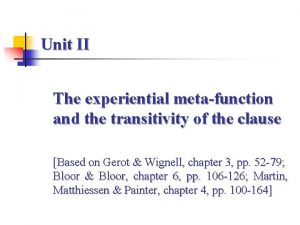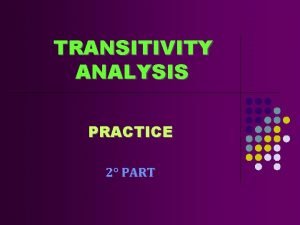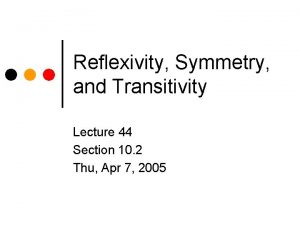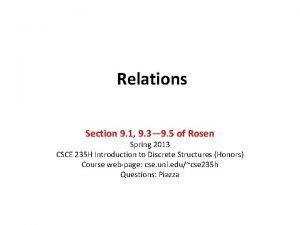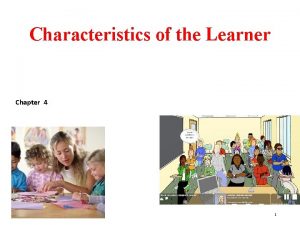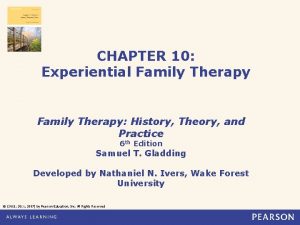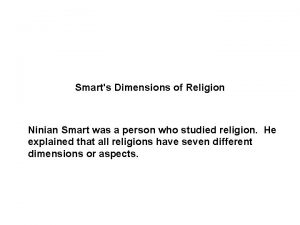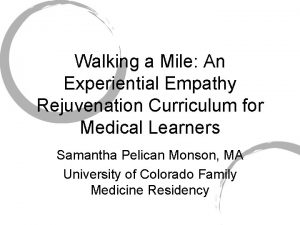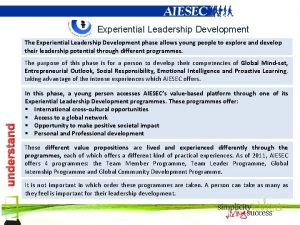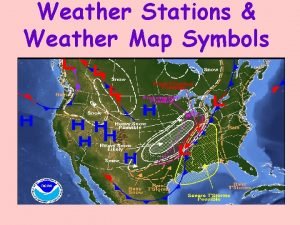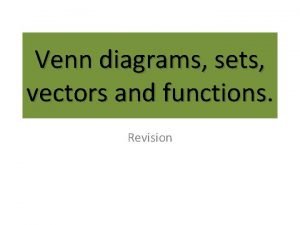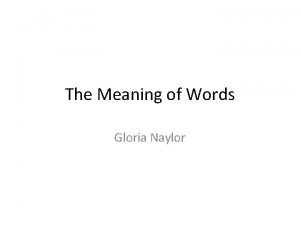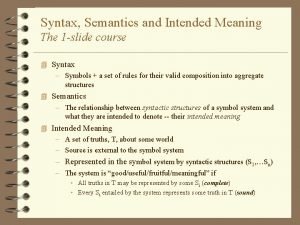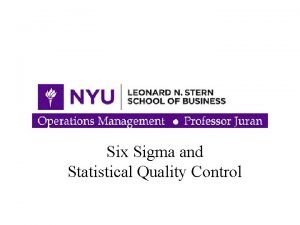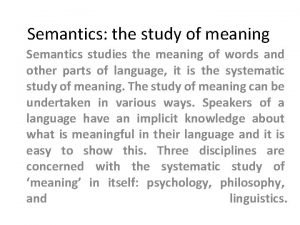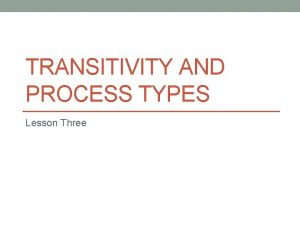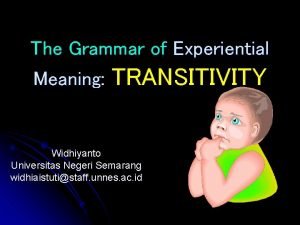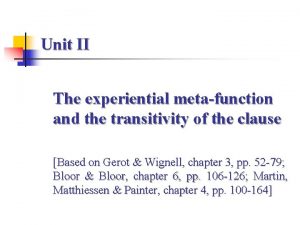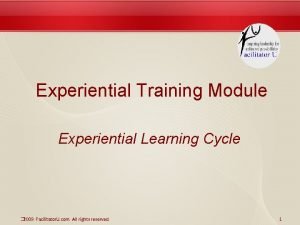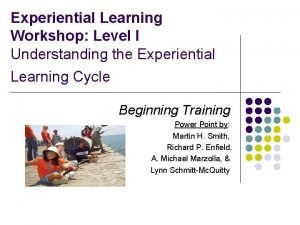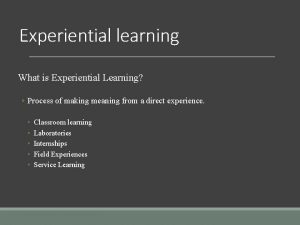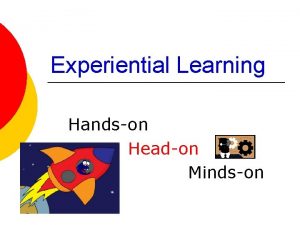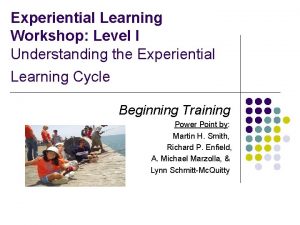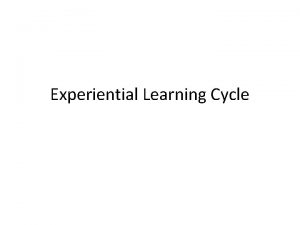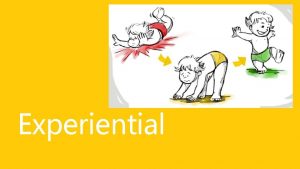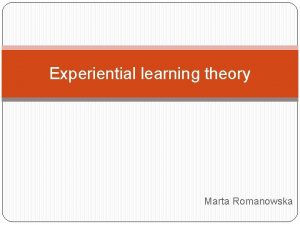Experiential meanings Language as representation transitivity meanings are



































- Slides: 35

Experiential meanings Language as representation: transitivity

• meanings are encoded in clauses because of the way different types of processes are represented in language

Three key components of processes: • The PROCESS • The PARTICIPANTS • The CIRCUMSTANCES

1. The process itself, typically realised grammatically as the verb phrase. For example: hit, sees, broke. 2. The participant(s) associated with the process, typically realised grammatically by the noun phrase. For example: John, she, the vase.

3. The circumstances associated with the process, typically realised grammatically by the prepositional and adverb phrases. For example, in the room, at breakfast, over the wall.

Six types of processes: 1. Material 2. Mental 3. Behavioural 4. Verbal 5. Relational 6. Existential

Material Processes 1. Material processes are those concerned with doing, and happen in the physical world. In this process, there is always an actor or actors, and usually, though not always, a goal.

For example; (1) John hit the ball. Actor Process Goal (2) The vase Goal broke. Process

Mental Processes 2. Mental processes are those concerned with sensing. mental processes are concerned with consciousness, involving: cognition (encoded in words such as understanding), reaction (such as despising) perception (such as tasting).

(3) Lucy puzzled over the problem (cognition) (4) Harry can’t stand Fish Senser Process (5) Cathie saw Senser Process Phenomenon (reaction) Phenomenon the dress (perception) Phenomenon

4 types of mental process: • Emotion • Cognition • Perception • Desideration

She I I hated liked appreciate Senser Mental: emotion him most music you keeping quiet Phenomenon

You No one She can imagine would choose never discovered his reaction such a colour his address Senser Mental: cognition Phenomenon

He He Lucy could not see heard felt anything a faint sound hot Senser Mental: perception phenomenon

I You don’t want may crave any trouble a drink Senser mental: desideration phenomenon

Bevavioural processes 3. Behavioural processes are those which embody physiological actions such as breathe and sneeze. They can also be expressed as states of consciousness as in cry or laugh, or processes of consciousness as forms of behaviour, such as dream, or worry. The participant in behavioural processes is the Behaver, the conscious entity who is behaving:

(6) She gasped at the sight. Behaver Process Circumstance (7) Joan laughed at the clown. Behaver (8) The dog Behaver Process Circumstance barked. Process

Verbal Processes 4. Verbal processes are processes of saying. The participant roles associated with this process are the Sayer, who is the producer of speech, the Receiver, who is the entity to which the speech is addressed, and the Verbiage, which is what gets said.

For example: (9) John told Sayer Process (10) The Judge Sayer the joke to his friends. Verbiage Receiver(s). announced the sentence Process Verbiage to the court. Receiver

Verbal process may be directed at, rather than addressed to, another participant: TARGET a) Need not be human b) Person to whom message is addressed, may be different from entity at which it is directed

The report sharply criticises Lily’s quality- control procedures Lily’s quality-control procedures Target

She keeps rubbishing me to the other people in the house. ‘Me’ target ‘the other people in the house’ receiver

Relational Processes 5. Relational processes are those which are to do with ‘being’, in the specific sense of establishing a relationship between two entities. The process is almost always taken from forms of the verb be (or a very small number of similar verbs such as seem or become), and the participant roles those of the Identifier and identified. (11) The show Carrier (12) Catherine’s car Carrier (13) Harry’s dog Carrier is on all evening. Process Attribute is a Volvo. Process Attribute was in the park. Process Attribute

Existential Processes 6. Existential processes assert that something exists or happens. Typically, they include the word there as a dummy subject, as in: There has been a theft or Has there been a fight? Normally one participant role, realised in the examples as a theft and a fight. Existential processes take us back to material ones, in that both can answer a question such as what happened? In a material process, an actor and a goal would be identified, with the participant role replaced by a process. There has been a theft: John stole - In the existential version, the actor and goal disappear, to be replaced by the Existent.

a) POLICE SHOOT 11 DEAD IN SALIBURY RIOT Riot police shot and killed 11 African demonstrators. (The Guardian, p. 1) b) RIOTING BLACKS SHOT DEAD BY POLICE Eleven Africans were shot dead and 15 wounded when Rhodesian police opened fire on a rioting crowd. (The Times, p 1)

RIOTING BLACKS SHOT DEAD Goal Process BY POLICE Actor Eleven Africans Goal were shot dead and 15 wounded Process when Rhodesian police opened fire on a rioting crowd Actor

a) POLICE SHOT BRAZILIAN EIGHT TIMES The man mistaken for a suicide bomber by police was shot eight times, an inquest into his death has heard. (BBC News On-Line 25 July 2005). b) SHOT MAN WAS NOT BOMBER – POLICE The man shot dead in Stockwell tube station yesterday was not connected to the attempted bombings of London on July 21, police said tonight. (The Guardian On-Line 23 July 2005).

POLICE SHOT BRAZILIAN Actor Process Goal EIGHT TIMES

The man mistaken for a suicide bomber Goal by police Actor was shot eight times, Process: material an inquest into his death Receiver Has heard Process: verbal

SHOT MAN Verbiage POLICE Sayer WAS NOT BOMBER –

The man shot dead in Stockwell tube station yesterday was not connected to the attempted bombings of London on July 21, Verbiage police said tonight. Sayer

POLICE Actor SHOOT Process 11 DEAD IN RIOT Goal Riot police shot and killed Actor Process 11 African demonstrators Goal

Nominal Groups • Name and describe people, places and things and events, typically (but not always) realised by the participant roles in a clause. • The choices in nominal groups contribute to the experiential meanings in a text.

• A nominal group consists of a main noun or ‘head’ word and has the potential to be expanded by adding information before the head word (premodification) and after it (postmodification). For example: My dog loved those bones. My dog loved those three smelly lamb bones from the butcher shop.

Those three smelly lamb Premodifier bones Head From the butcher’s shop Postmodifier
 Mikael ferm
Mikael ferm Experiential metafunction examples
Experiential metafunction examples Transitivity
Transitivity Reflexivity symmetry and transitivity
Reflexivity symmetry and transitivity Antisymmetric relation
Antisymmetric relation Ruth anne rehfeldt
Ruth anne rehfeldt Experiential family therapy satir
Experiential family therapy satir Knowledge readiness to learn
Knowledge readiness to learn Conjoint family drawing
Conjoint family drawing Experiential dimension of religion
Experiential dimension of religion Kolb's learning cycle pdf
Kolb's learning cycle pdf Experiential empathy
Experiential empathy Numerative
Numerative Experiential leadership training
Experiential leadership training Audrey cook therapist vancouver
Audrey cook therapist vancouver Suss overseas experiential learning
Suss overseas experiential learning Council for adult and experiential learning
Council for adult and experiential learning Experiential learning portfolio
Experiential learning portfolio Experiential futures
Experiential futures Data representation in assembly language
Data representation in assembly language Station map symbol
Station map symbol Distance and displacement venn diagram
Distance and displacement venn diagram Gold blue green orange personality test
Gold blue green orange personality test Tlingit totem pole meanings
Tlingit totem pole meanings The meanings of a word naylor questions and answers
The meanings of a word naylor questions and answers Syntax symbols and meanings
Syntax symbols and meanings Common symbols in literature
Common symbols in literature Espn fantasy baseball symbol meanings
Espn fantasy baseball symbol meanings Statistical symbols and meanings
Statistical symbols and meanings Sign sign everywhere a sign
Sign sign everywhere a sign Improper subset
Improper subset Types of meaning
Types of meaning What are sacred vessels
What are sacred vessels Rwandan proverbs
Rwandan proverbs Rorshach inkblot test
Rorshach inkblot test Rastafarian origin
Rastafarian origin

